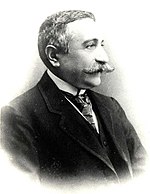Constantin C. Arion, Date of Birth, Place of Birth, Date of Death
TweetConstantin C. Arion
Romanian politicianAbout Constantin C. Arion
- Constantin C.
- Arion (also known as Costica Arion; June 18, 1855 – June 27, 1923) was a Romanian politician, affiliated with the National Liberal Party, the Conservative Party and, after 1918, the People's Party.
- He served two terms as Minister of Religion and Public Instruction, one term as Minister of Agriculture, and another one as Interior Minister before World War I.
- His career peaked in 1918, when he was Minister of Foreign Affairs. A young lawyer who supported political reform, Arion moved progressively to the right, and, ca.
- 1885, became involved with the political club Junimea.
- As a Conservative policymaker and disciple of Alexandru Marghiloman, he rewrote legislation on education reform and brought the Romanian Orthodox Church under the control of its high clergy.
- Like Marghiloman, Arion supported the Central Powers during most of World War I, a position which seemed to carry most weight during the 1918 armistice.
- His participation in the Marghiloman government recovered for Romania the region of Bessarabia, but the subsequent return of Ententist forces made him a political suspect.
- He spent the remainder of his life as a marginal. In addition to his presence in political life, Arion was an art patron, university professor, and philanthropist.
- He was the brother of Virgil Arion, and the father of Dinu C.
- Arion.
Read more at Wikipedia
See Also
- Famous People's Birthdays on 18 June, Romania
- Famous People's Birthdays in June, Romania
- Famous lawyer's Birthdays on 18 June, Romania
- Famous lawyer's Birthdays in June, Romania
- Famous politician's Birthdays on 18 June, Romania
- Famous politician's Birthdays in June, Romania
- Famous diplomat's Birthdays on 18 June, Romania
- Famous diplomat's Birthdays in June, Romania


 Date of Birth:
Date of Birth:  Place of Birth: Bucharest
Place of Birth: Bucharest